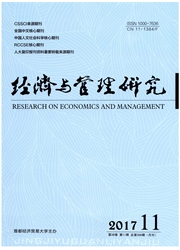

 中文摘要:
中文摘要:
财政分权改革有效发挥财政激励作用,极大地调动地方政府开展经济建设的热情和决心,促进各地在政绩标尺下展开经济竞争。与此同时,地方政府作为义务教育支出责任的承担主体,在GDP导向和政绩考核的双重压力下,财政分权是否有利于城乡义务教育均等化成为人们关注的重点。本文首先提炼国内外文献综述,梳理财政分权与城乡义务教育的理论关系,利用我国2003-2013年省级面板数据,采用复合指标测算城乡义务教育均衡指数,从省级和省内财政分权的双重视角,实证考察财政分权对我国城乡义务教育均等化的影响。本文主要结论:省级财政分权有助于缩小城乡义务教育差距,但省内财政分权对城乡义务教育均衡发展是不利的,在此结论基础上,提出相关政策建议。
 英文摘要:
英文摘要:
Fiscal decentralization reform effectively plays the role of fiscal incentives, which greatly mobilizes the enthusiasm and determination of local governments to carry out economic construction,and promotes economic competition in the achievement scale. At the same time,the local government as the principal subject of compulsory education expenditure,in the GDP oriented and performance evaluation, whether fiscal decentralization is conducive to the equality of urban and rural education has become the focus of people's attention. In this paper,we firstly extract the literature review both at home and abroad, combing the theoretical relationship between fiscal decentraliza- tion and urban and rural compulsory education ,and then use the 2003 -2013 provincial panel data to calculate bal- anced urban and rural education index through composite index system, from the perspective of provincial and sub - provincial fiscal decentralization, to observe the fiscal decentralization on the influence of the equalization of urban and rural education. The main conclusions of this paper: the provincial fiscal decentralization is helpful to reduce the gap between urban and rural compulsory education,but the sub -provincial fiscal decentralization is unfavorable to the balanced development of urban and rural compulsory education. Based on this conclusion, provide some relevant policy recommendations.
 同期刊论文项目
同期刊论文项目
 同项目期刊论文
同项目期刊论文
 期刊信息
期刊信息
